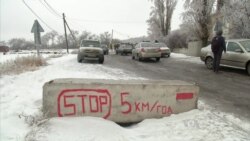At the last checkpoint before the battle zone, Ukrainian troops keep a careful watch on who goes in, while families squeeze into cars to leave and busloads of children head out to relatives or shelters.
Just beyond is the mostly deserted town of Papasna, which has repeatedly been hit by shelling. Many of those who remain support the rebels and are not happy to see Western visitors.
Mayor Yuriy Onishenko and a handful of his staff members, who are loyal to the Kyiv government, try to keep working amid the shelling.
“As mayor, I can not even list all my functions, because everything depends on me now," Onishenko said. "The first half of my working day, my deputy and I go in my personal car, and the seven or eight city workers I still have also go out, and we bring hot food to the people taking shelter in the basements.”
Not far away is Debaltseve, where Ukrainian troops are holding on, in the face of a siege that's lasted more than a week.
The new governor of the partly occupied Donetsk region, Ukrainian Army General Alexander Kihtenko, is clear on what is needed.
“Of course, as a military man, as a general of the Ukrainian army, I can say that, yes, we really need military aid today, including communication and reconnaissance equipment, and other modern weaponry, probably anti-tank weapons," Kihtenko said. "We have specialists who can use modern weapons. But of course some instructors would also be helpful.”
The governor has a new artifact in his office: a piece of one of the shells officials say hit the city of Mariupol two weeks ago, killing 30 people.
Western economic sanctions have not persuaded Russian President Vladimir Putin to back off on his support for the rebels. Providing weapons would increase the pressure, but the reaction is hard to predict, said analyst Yaroslav Voitko of the International Center for Policy Studies in Kyiv.
Provision of lethal weapons might convince Putin "that the world is serious in stopping this," Voitko said. "But his reactions could not be predicted, and anything, unfortunately, is possible.”
It is that unpredictability that has kept the foreign weapons out so far. But beleaguered troops may soon be getting more help, as they struggle to hold the line.





